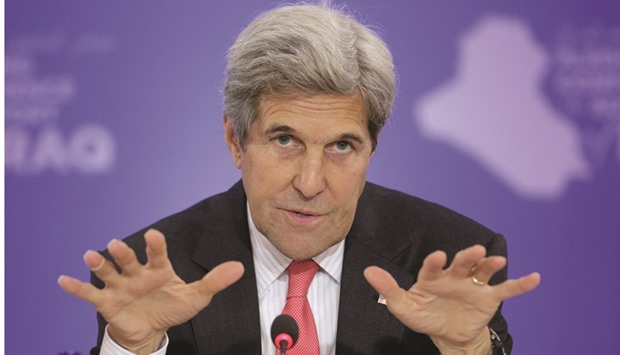US Secretary of State John Kerry said yesterday that the battlefield momentum in Iraq and Syria has shifted against Islamic State but the international community must now also confront the challenge of stabilising newly liberated areas.
“The momentum has shifted,” Kerry told an international conference to raise funds for Iraq. “The new challenge that we face is securing and aiding for the recovery of a liberated area.”
Lise Grande, the United Nations’ humanitarian co-ordinator for Iraq, warned that without addressing the needs of Iraqis displaced by the conflict, military victories will prove transient.
“The military campaign will have achieved a great short-term success, but perhaps little else of enduring impact,” she said.
The officials were speaking as defense and foreign ministers gathered in Washington to raise funding for Iraq and to agree on next steps in the fight against Islamic State, in particular the militant group’s bastion in Mosul.
Kerry said the goal of the pledging session was to raise at least $2bn in new aid for Iraq to help communities get back on their feet once Islamic State militants have been driven out.
The battle for Mosul is expected to be difficult, but the aftermath could be tougher, Iraqi, United Nations and US officials say.
Plans are still being finalised to provide urgent humanitarian aid and restore basic services and security for residents and as many as 2.4mn displaced people.
Defence ministers of the US-led coalition against Islamic State were also meeting at Joint Base Andrews outside Washington, followed by a joint session of foreign and defense chiefs today to discuss the broader fight against Islamic State not only in Syria and Iraq, but also Libya and recent attacks in Europe.
The United Nations is preparing for what it says will be the largest humanitarian relief operation so far this year as terrified people stream out of the path of the advancing Iraqi military and flee from the city itself.
They will need shelter, food and water, and sanitation for three to 12 months, depending on the extent of the city’s destruction.
The vast majority of the expected refugees will be Sunni Muslims, many of whom feel disenfranchised by Iraq’s Shia-led government in Baghdad, and that presents what could be an even bigger problem.
Mosul, which Islamic State seized from a collapsing Iraqi army in June 2014, is Iraq’s second biggest city and home to a combustible mixture of Sunni Arabs, Kurds, Turkmen and others.
Officials in Erbil, the capital of Iraq’s autonomous Kurdish region, criticised the coalition yesterday for excluding the Kurds from the Washington gathering, with Masrour Barzani, head of the regional security council, calling it “a travesty” on Twitter.
Although Iraqi and US officials have not announced a timetable for moving on Mosul, a senior Baghdad-based diplomat said Abadi wants to advance the start of the Mosul campaign to October after the seizure of Fallujah from Islamic State last month.
This month, Iraqi forces backed by US air power retook Qayara air base south of Mosul, which will be turned into a logistics hub for the main assault on the city.
The UN estimates that under a worst-case scenario, more than 1mn people could be displaced from Mosul and another 830,000 from a populated corridor south of the city, adding to the burden of caring for 3.5mn Iraqis already displaced.

US Secretary of State John Kerry speaks during a Pledging Conference in Support of Iraq.
